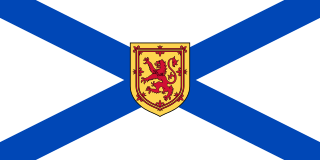| Route 320 | ||||
|---|---|---|---|---|
| Route information | ||||
| Maintained by Nova Scotia Department of Transportation and Infrastructure Renewal | ||||
| Length | 23 km [1] (14 mi) | |||
| Major junctions | ||||
| South end | ||||
| North end | ||||
| Location | ||||
| Counties | Richmond | |||
| Highway system | ||||
Provincial highways in Nova Scotia
| ||||
Route 320 is a collector road in the Canadian province of Nova Scotia.

Canada is a country in the northern part of North America. Its ten provinces and three territories extend from the Atlantic to the Pacific and northward into the Arctic Ocean, covering 9.98 million square kilometres, making it the world's second-largest country by total area. Canada's southern border with the United States, stretching some 8,891 kilometres (5,525 mi), is the world's longest bi-national land border. Its capital is Ottawa, and its three largest metropolitan areas are Toronto, Montreal, and Vancouver. As a whole, Canada is sparsely populated, the majority of its land area being dominated by forest and tundra. Consequently, its population is highly urbanized, with over 80 percent of its inhabitants concentrated in large and medium-sized cities, with 70% of citizens residing within 100 kilometres (62 mi) of the southern border. Canada's climate varies widely across its vast area, ranging from arctic weather in the north, to hot summers in the southern regions, with four distinct seasons.

Nova Scotia is one of Canada's three Maritime Provinces, and one of the four provinces that form Atlantic Canada. Its provincial capital is Halifax. Nova Scotia is the second-smallest of Canada's ten provinces, with an area of 55,284 square kilometres (21,300 sq mi), including Cape Breton and another 3,800 coastal islands. As of 2016, the population was 923,598. Nova Scotia is Canada's second-most-densely populated province, after Prince Edward Island, with 17.4 inhabitants per square kilometre (45/sq mi).
Contents
It is located in Richmond County and connects Louisdale at Exit 46 on Highway 104 with Arichat at Route 206 .

Richmond County is a county in the Canadian province of Nova Scotia. For a list of communities in Richmond County, see the eponymous page.

Louisdale is a Canadian rural community in Richmond County, Nova Scotia. The community is located on Cape Breton Island at the centre of a French-Acadian region. Founded mainly by families from nearby Petit-de-Grat, its early settlers were primarily of Acadian and, from the early 19th century, Scottish descent. It has 2 schools, park areas, and places to eat catering to tourists and residents.

Highway 104 in Nova Scotia, Canada, runs from Fort Lawrence at the New Brunswick border near Amherst to River Tillard near St. Peter's. Except for the portion on Cape Breton Island between Port Hawkesbury and St. Peter's, it is part of the Trans-Canada Highway.
It crosses the Lennox Passage using the Burnt Island Bridge (a drawbridge [2] ) that connects Cape Breton Island to Isle Madame.

A drawbridge or draw-bridge is a type of movable bridge typically at the entrance to a castle or tower surrounded by a moat. In some forms of English, including American English, the word drawbridge commonly refers to all types of movable bridges, such as bascule bridges, vertical-lift bridges and swing bridges, but this article concerns the narrower, more historical definition of the term.

Cape Breton Island is an island on the Atlantic coast of North America and part of the province of Nova Scotia, Canada.






